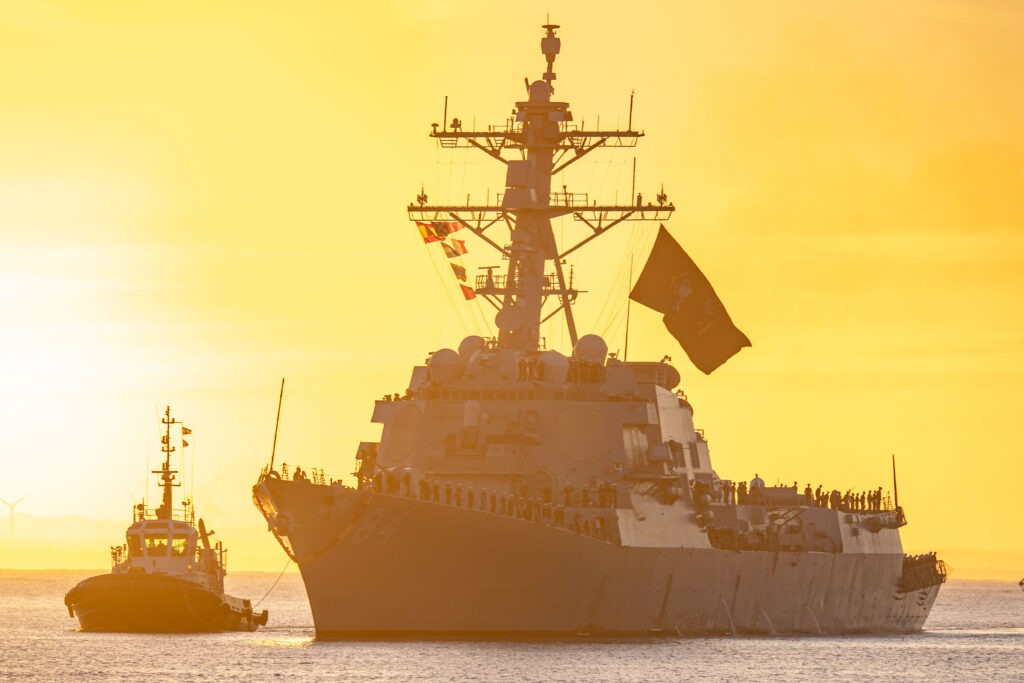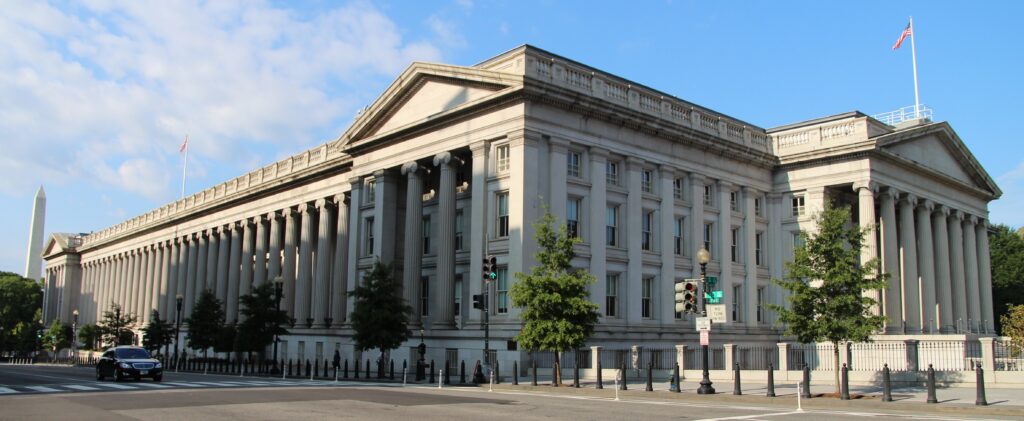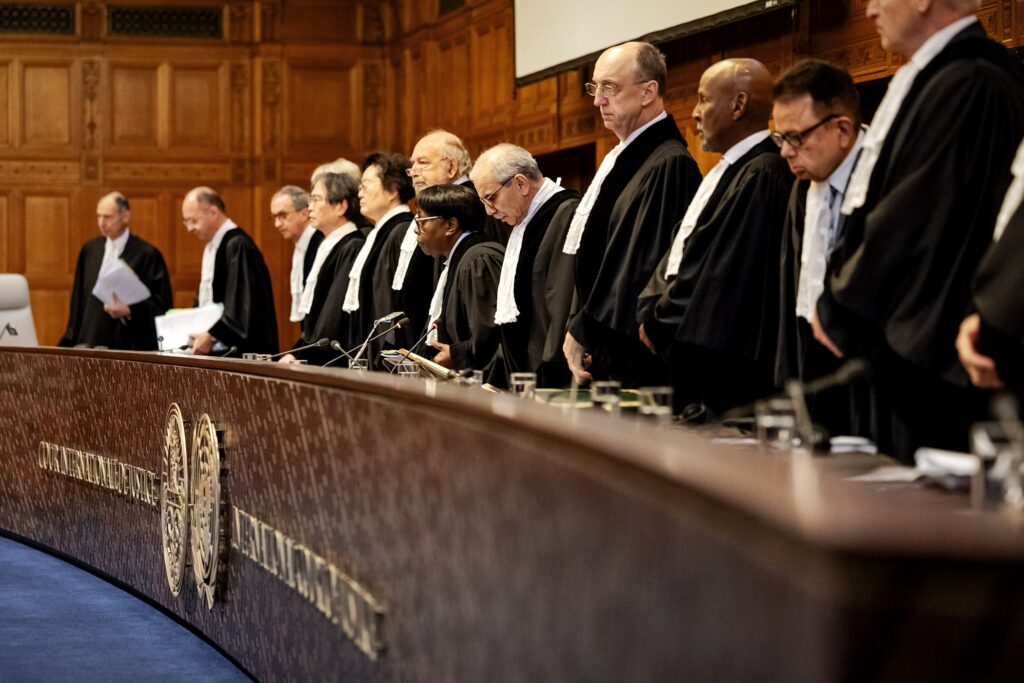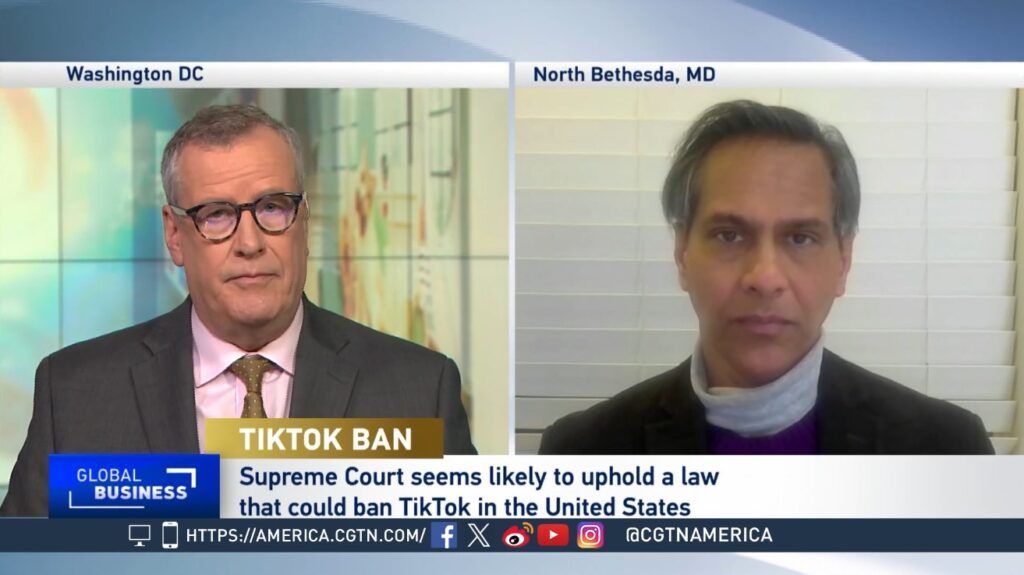
ICAS Bulletin (online ISSN 2836-3418, print ISSN 2836-340X) is published every other week throughout the year at 1919 M St NW, Suite 310, Washington, DC 20036.
The online version of ICAS Bulletin can be found at chinaus-icas.org/bulletins/.

– On January 6, the U.S. Department of Defense expanded its list of “Chinese military companies,” targeting firms like Tencent and CATL to highlight their alleged ties to China’s military-tech fusion strategy.
– On January 3, the U.S. Department of the Treasury sanctioned Integrity Technology Group for allegedly aiding the Chinese hacking group Flax Typhoon in cyberattacks on U.S. communications and global surveillance.
– The Biden administration is considering new rules to ban Chinese drones in the U.S. due to national security risks, such as concerns over cyberespionage and critical infrastructure vulnerabilities.
– On January 2, China announced punitive trade measures against 28 U.S. companies, including Raytheon and Lockheed Martin, for their arms sales to Taiwan.
Associated News References:
“Pentagon Labels More Chinese Companies As Military In Nature,” The Wall Street Journal, January 7
“Treasury Dept. Hits Chinese Tech Company With Sanctions After Breach,” The New York Times, January 3
“U.S. Weighs Ban On Chinese Drones, Citing National Security Concerns,” The New York Times, January 3
“China Hits Dozens Of U.S. Companies With Trade Controls,” The New York Times, January 2

– Japan, Australia, the Philippines, and Taiwan are expanding their amphibious capabilities to counter China’s growing military presence.
– Experts suggest that China’s first sixth-generation stealth fighter jet may have advanced stealth capabilities at hypersonic speeds, signaling that the PLA has surpassed global advanced standards.
– The Asia-Pacific arms race is intensifying as countries like Japan and the Philippines significantly increase defense budgets to counter China’s growing military capabilities.
– On December 28, China launched its next-generation Type 076 amphibious assault ship, which features cutting-edge electromagnetic catapult technology. The launch marks a major step in its naval expansion to rival the United States.
Associated News References:
“Asia-Pacific Nations Boost Amphibious Naval Fleets To Repel China,” Defense News, January 8
“Is China’s Mystery 6th-Gen Stealth Fighter Poised To Be A Command Center For Combat Drones?” South China Morning Post, January 5
“China And Trump Factor Will Heat Up Asia-Pacific Arms Race, Observers Warn,” South China Morning Post, January 5
“China Launches New Amphibious Assault Ship In A Race To Rival Us Military,” CNN, December 27

– On January 10, the U.S. Supreme Court heard arguments on the constitutionality of a federal law banning TikTok, with justices appearing skeptical of TikTok’s case.
– The Pentagon’s blacklist has added Tencent and CATL and caused stock drops, while China condemned the U.S. move as “unjust” and vowed to defend its companies’ rights.
– On January 3, the Justice Department urged the Supreme Court to reject President-elect Donald Trump’s request to delay a law that requires TikTok to be sold or banned by January 19, while the President-elect remains publicly opposed to banning the platform.
– The Supreme Court is set to hear arguments in a high-stakes case regarding TikTok’s future in the U.S., while TikTok and its users argue the law violates First Amendment rights and would unjustly censor a popular social platform.
– American companies have largely muted their defense of trade ties with China, citing increased economic challenges, domestic competition, and restrictive policies in both countries.
– On December 27, China extended tariffs, sanctioning seven American firms over their increasing arms sales to Taiwan, and threatening to halt purchases of U.S. semiconductors.
– On December 23, the Biden administration launched a trade investigation into China’s production of legacy semiconductors, citing concerns over unfair subsidies and national security risks.
Associated News References:
“US Supreme Court Seems Likely To Uphold TikTok Ban-Or-Sale Law In Hearing,” The Guardian, January 10
“Tencent Shares Decline After US Adds Company To Chinese Military Blacklist,” Bloomberg, January 6
“Justice Department Urges Supreme Court To Reject Trump’s Push To Pause TikTok Ban,” NBC News, January 4
“TikTok And Government Clash In Last Round Of Supreme Court Briefs,” The New York Times, January 3″
“U.S. Companies Vouched For China During Trump’s First Term. Not Anymore.” The Wall Street Journal, January 2
“China Firing Preemptive Trade War Shots At Trump,” Asia Times, December 28
“U.S. Takes Aim At China’s Production Of Essential Chips,” The New York Times, December 23

– Taiwan is investigating whether a Chinese-linked vessel damaged its undersea internet cable on January 3 and vows to pursue independent satellite resilience in potential crises.
-On January 7, Taiwan launched military drills to showcase its upgraded U.S.-supplied defense systems to bolster readiness against potential conflicts.
-On January 1, Taiwanese President Lai Ching-te, in his New Year’s address, vowed to bolster Taiwan’s defenses against advancing PRC’s capabilities, claiming the island’s role as a global “line of defense for democracy.”
– On December 22, China’s navy and coast guard conducted joint operations in December, which resembled a naval blockade in the Miyako Strait and near the Diaoyu/ Senkaku Islands, responding to the US arms sale of Abrams tanks to Taiwan.
– On December 16, Taiwan received its first batch of 38 advanced U.S.-made Abrams M1A2 tanks, demonstrating Taiwan’s efforts to modernize its defenses with U.S. arms.
Associated News References:
“Taiwan Suspects A Chinese-Linked Ship Of Damaging An Internet Cable,” The New York Times, January 7
“Taiwan Holds Military Drills As Concerns Rise Over Possible Defense Budget Cut,” ABC News, January 7
“Taiwan President Vows To Boost The Island’s Defense Budget As China Threats Rise,” AP News, January 1
“China Conducts Naval Blockade Exercise In Miyako Strait; Ccg Ships Near Senkaku Islands Given Stronger Weapons,” The Japan News, January 1
“Taiwan Receives First Batch Of Us-Made Abrams Tanks,” Voice of America, December 16

– On January 7, U.S. President-elect Donald Trump reiterated his hardline stance on China. He also cited China’s presence in the Panama Canal and Greenland and refused to rule out military or economic actions to reclaim these strategic territories.
– On January 7, China has confirmed that President Xi Jinping has been communicating with U.S. President-elect Donald Trump, with Chinese officials emphasizing the importance of these discussions.
– On January 7, a virtual discussion between Chinese Vice-Premier He Lifeng and U.S. officials addressed Beijing’s concerns over recent 301 trade investigations, highlighting tensions as Trump prepares to take a firm stance on tariffs.
– Treasury Secretary Janet Yellen raised “serious concerns” with China’s Vice Premier He Lifeng about state-sponsored cyberattacks, including an alleged breach of Treasury Department computers on December 30, highlighting strained U.S.-China ties ahead of President-elect Donald Trump’s inauguration.
– On January 6, during a visit to South Korea, Secretary of State Antony Blinken navigated tensions as North Korea tested another ballistic missile and South Korea grappled with political turmoil, highlighting U.S. efforts to maintain stability and alliances in the region.
Associated News References:
“Donald Trump Refuses To Rule Out Military Action Over Panama Canal And Greenland,” South China Morning Post, January 7
“China Confirms Xi Jinping And Donald Trump Have Been In Touch Since US Election,” South China Morning Post, January 7
”US-China Dialogue Touches On ‘Candid’ Concerns Before Trump Takes Office,” South China Morning Post, January 7
“Yellen Tells China’s Vice Premier Hacks Raise ‘Serious Concern,’” Bloomberg, January 6
“In South Korea, Blinken Affirms Alliance Amid Challenges Facing Democracies,” The New York Times, January 6

“U.S. To Ban Chinese, Russian Components In Connected Vehicles,” The Wall Street Journal, January 14
“Taiwan Nuclear Exit Paves Way For More Gas, Says GE Vernova,” Bloomberg, January 6
“Antony Blinken: ‘china Has Been Trying To Have It Both Ways,’” Financial Times, January 3
“Treasury’s Sanctions Office Hacked By Chinese Government, Officials Say,” The Washington Post, January 1
“US Investors In China Venture Funds Race To Comply With New Tech Rules,” Financial Times, January 1
“China Pays Tribute To Former US President Jimmy Carter, ‘Promoter’ Of Diplomatic Ties,” South China Morning Post, December 30
January 14 hosted by Center for Strategic & International Studies
January 13 hosted by The Brookings Institution
January 10 hosted by The Brookings Institution
January 9 hosted by The Brookings Institution
January 8 hosted by Council on Foreign Relations
January 8 hosted by Stimson Center
January 15 hosted by Center for Strategic & International Studies
January 15 hosted by Asia Society
January 16 hosted by Asia Society
January 16 hosted by Carnegie Endowment for International Peace
The 2024 Q4 issue of the ICAS Blue Carbon & Climate Change Program Quarterly has been released!
Released the first week of every new quarter, the BCCC Quarterly is a magazine-style newsletter that records the most important trends and developments regarding blue carbon and climate change policies and regulations in China, the U.S., and other regions, as well as international regimes such as the United Nations. It also includes two special sections — the ‘Theme of the Quarter’ and the ‘Blue Carbon Country Profile’ — that aim to bring a fresh element to each issue.
This quarter’s Theme is on “Mixed Results in Climate Cooperation” and the Country Profile is on “Saudi Arabia,” both researched and written by Research Assistant Zhangchen Wang.
Trump’s Greenland gambit spotlights geopolitical tussle over the Arctic
By Nong Hong
January 13, 2025
In August 2019, then US president Donald Trump made headlines with his surprising proposal to buy Greenland from Denmark. While the idea was met with scepticism and humour, it also reignited a historical debate and shed light on Greenland’s growing geopolitical significance.
As Trump prepares to re-enter the White House, his renewed interest in Greenland – and its implications for US foreign policy and Arctic governance – merits deeper examination. The idea is not new…

This commentary was originally released by South China Morning Post on January 13, 2025.
The Growing Wave of Climate Change Litigation: Trends and Impacts
By Nong Hong
January 10, 2025
Climate change litigation has emerged as a powerful tool in the global fight against the climate crisis. With its ability to hold states, corporations, and other stakeholders accountable, climate litigation is becoming a cornerstone of climate governance. Recent cases brought before international and regional legal institutions, such as the International Tribunal for the Law of the Sea (ITLOS) and the International Court of Justice (ICJ), underscore the transformative potential of legal actions in addressing climate-related challenges. The trends and impacts of climate litigation deserve careful examination, including how it reshapes legal principles, drives accountability, and influences policy…

Why Multilateral Development Banks Hold the Future of Climate Finance
By Zhangchen Wang
January 6, 2025
Climate finance refers to financial resources that are used to address the challenges posed by climate change. Climate financing supports three main objectives: mitigation, adaptation, and resilience-building. Mitigation focuses on reducing greenhouse gas emissions through efforts like developing renewable energy projects and enhancing energy efficiency. Adaptation brings about initiatives such as constructing disaster-resilient infrastructure and implementing agricultural practices that help communities adjust to the effects of climate change. Resilience-building enhances the capacity of systems and societies to withstand and recover from climate-related shocks to ensure long-term sustainability in the face of climate risks.
Generally speaking, climate finance is delivered through several key channels: multilateral and bilateral climate funds and aid, multilateral development banks (MDBs), and private sector investments…

On Monday, January 13, 2025, Senior Fellow Sourabh Gupta discussed the U.S. Supreme Court hearing on the potential TikTok ban on CGTN America’s Global Business.
On Friday, January 10, 2025, Senior Fellow Sourabh Gupta was quoted by South China Morning Post on the prospects for China-Canada relations in the Donald Trump and post-Justin Trudeau era.
On Wednesday, January 1, 2025, Senior Fellow Sourabh Gupta was interviewed by CGTN on the President Xi’s New Year Address.
On Thursday, December 26, 2024, the ICAS 2024 Annual Conference and Keynote address by Minister Qiu Wenxing were discussed on Pekingology.
On Wednesday, December 25, 2024, Senior Fellow Sourabh Gupta was interviewed by CGTN on the role of tariffs on U.S.-China relations.
On Wednesday, December 25, 2024, Senior Fellow Sourabh Gupta was quoted by China Daily on the expected impact of higher tariffs in U.S.-China trade ties.
On Tuesday, December 17, 2024, the Keynote address by Minister Qiu Wenxing at the ICAS 2024 Annual Conference was summarized by the Embassy of the People’s Republic of China in the United States of America.



The Institute for China-America Studies is an independent nonprofit, nonpartisan research organization dedicated to strengthening the understanding of U.S.-China relations through expert analysis and practical policy solutions.
1919 M St. NW Suite 310,
Washington, DC 20036
icas@chinaus-icas.org
(202) 968-0595
© 2025 INSTITUTE FOR CHINA-AMERICA STUDIES. ALL RIGHTS RESERVED.